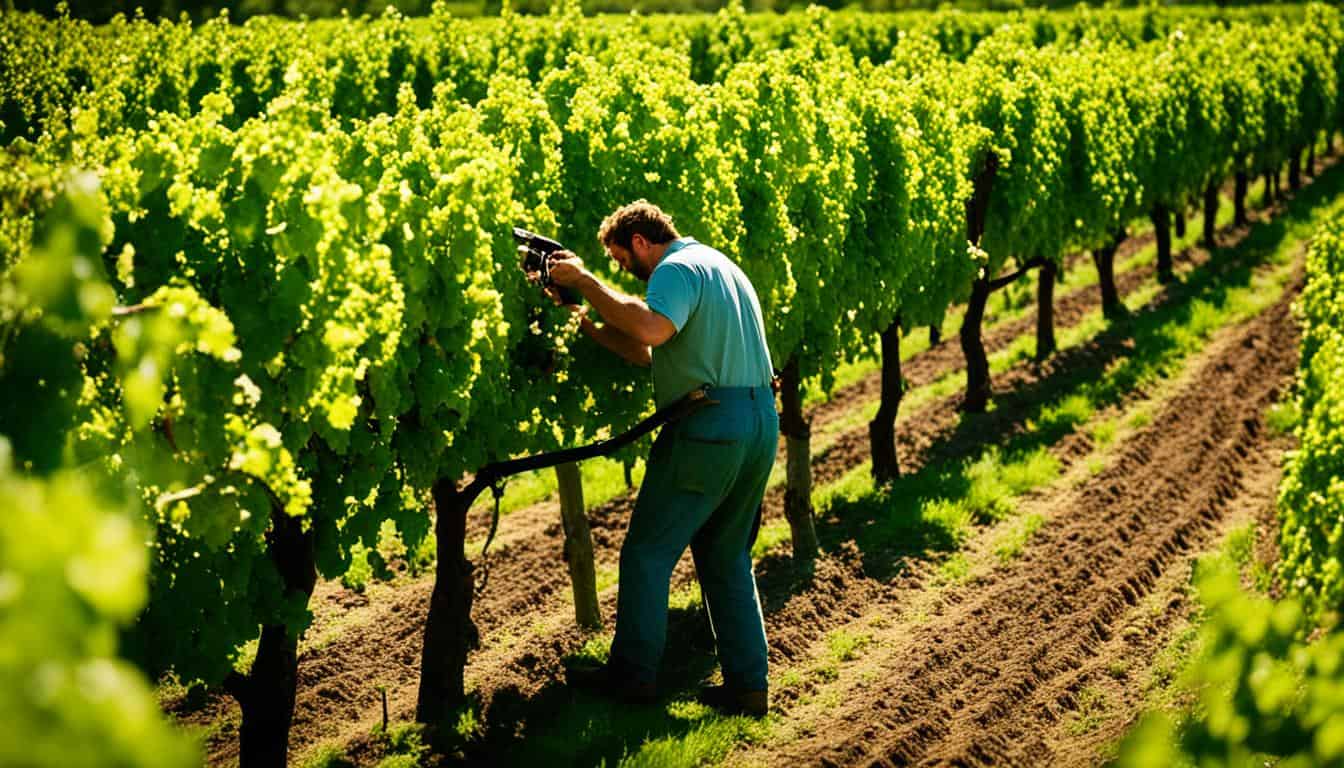Table of Contents
When we think about the Bible, we might not consider agricultural practices first. Yet, this sacred text provides timeless wisdom. It teaches how to farm, manage resources, and support sustainability. The Bible’s guidance, from crop rotation to fairness, is still as important now as it was long ago.
Ever thought about what we can learn from the Bible’s farming ways for sustainable living? Let’s explore Agricultural Practices in the Bible. This study will uncover ancient wisdom that can positively affect our world today and tomorrow.
On this journey, we’ll learn about eight key farming practices from the Bible. These methods weren’t just good for farming back then. They also showed care for the earth, fairness, and thankfulness to a higher being. We’ll look at things like crop rotation, fallowing, and water management, plus more. Each one offers us tips for our own lives today.
Join us to discover the Bible’s plan for a better connection with the earth. See how these ancient methods can make a big difference in our lives now. Let’s use the past’s wisdom to build a sustainable and rewarding future.
Crop Rotation and Fallowing the Land
The Bible gives us guidance on farming, like the need for crop rotation and letting fields rest. Fallowing, or leaving fields untouched for a season, helps soil get back its nutrients. This makes crops healthier. The practice is old but still important today.
Crop rotation means growing different crops in the same field at different times. It stops the soil from losing all of its nutrients. This way, the soil stays healthy. Rotating crops also cuts down on pests and diseases. Less need for chemical pesticides is good for the environment.
“And in the seventh year there shall be a sabbath of solemn rest for the land, a sabbath to the Lord:
And thou shalt sow thy field, and thou shalt prune thy vineyard; thou shalt gather in the fruit thereof.” (Leviticus 25:3-5)
Fallowing is another vital practice the Bible talks about. It lets the land re-nourish itself by staying untouched. Resting the soil like this makes it more fertile. This leads to better crops later.
Not farming also helps the environment. It lets helpful insects, birds, and tiny organisms thrive. This benefits the soil. Fallowing also stops soil from washing away. And it helps the soil keep water, so there’s less need to water the fields.
Using crop rotation and fallowing needs careful thought. Farmers must choose the right order for crops and when to let the land rest. The success of these methods also relies on soil and weather conditions, and the kinds of crops used.
With tips from the Bible, like using crop rotation and fallowing, farmers can keep the soil healthy for the future. This helps the environment and keeps farms productive for years to come.
| Crop Rotation Benefits | Fallowing Benefits |
|---|---|
| Prevents soil nutrient depletion | Allows the soil to replenish its nutrients |
| Breaks pest and disease cycles | Promotes soil health and balance |
| Reduces reliance on chemical pesticides | Creates a natural habitat for beneficial organisms |
| Sustains long-term agricultural productivity | Prevents soil erosion and improves water retention |
Planting Boundaries and Avoiding Mixed Seedlings
In the Bible, Leviticus 19:19 talks about keeping planting areas clean by not mixing seeds. Watering only one seed type helps keep crops pure. This tradition helped ancient farmers keep their harvests free from impurities.
Planting boundaries mean keeping different crops apart. If they mix, qualities get mixed up. This keeps every crop true to its own type.
Mixing seeds on purpose, as the Bible warns, is bad. It may sound like fun mixing different seeds in one field. But it actually hurts the crops by mixing the good and bad together, making harvests less pure and maybe smaller.
“Avoiding mixed seedlings is crucial for agricultural purity,” says Dr. Sarah Peterson, a top expert. “Following strict planting rules and saying no to mixed seeds helps keep crop integrity high.”
Ancient farmers kept their fields clean by hewing to these rules. They didn’t just do this for more crops. It was also about respecting their work and staying true to God’s guiding principles.
Benefits of Planting Boundaries and Avoiding Mixed Seedlings
Staying pure in planting had many upsides for early farmers:
- Purity of crops: Sticking to one seed per field meant crops stayed true to their types.
- Preservation of biodiversity: It also helped keep a wide range of plants growing well together.
- Improved crop yields: This led to big and better harvests by not mixing the wrong plants.
- Enhanced crop quality: It made sure crops looked and tasted great, and were good for eating.
Choosing to plant without mixing seeds told a deeper story. It showed care for the land and following God’s guidelines. It was about honoring the gifts they got from the world.
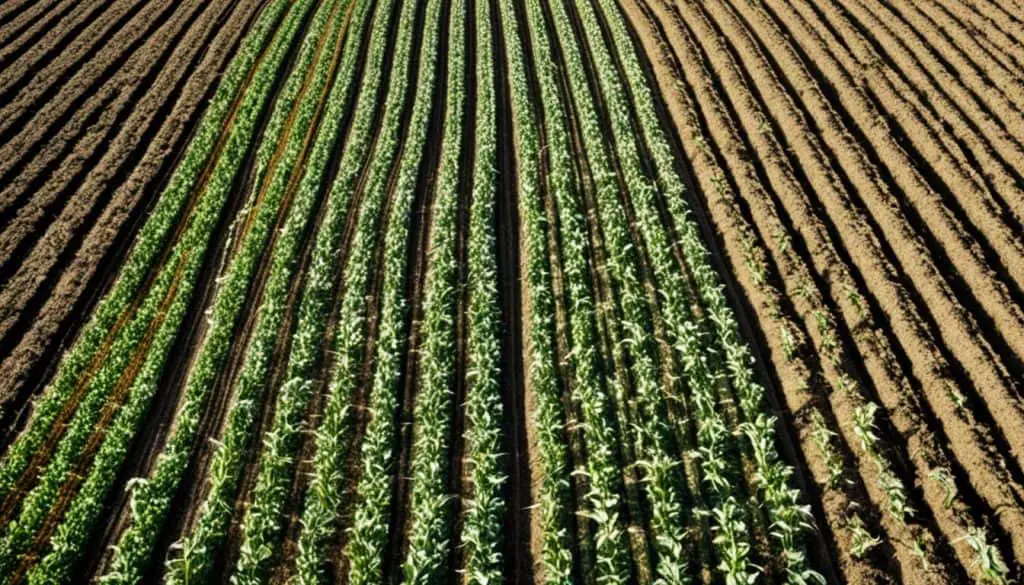
| Practice | Benefits |
|---|---|
| Maintaining Planting Boundaries | Preservation of crop purity and distinctiveness Prevention of cross-contamination and cross-pollination Conservation of biodiversity and ecosystem resilience |
| Avoiding Mixed Seedlings | Enhanced crop quality and appearance Maximized productivity and crop yields Preservation of varietal characteristics |
Gleaning for Social Justice
Gleaning shows a strong commitment to social justice. It’s about saving food and making sure everyone can eat. Leviticus 19:9-10 talks about this. It says to leave parts of your harvest for the poor. This helps all people access food and resources.
This tradition reminds us to look out for the needy. It’s more than just giving food. It builds a society based on sharing and kindness.
“When you reap the harvest of your land, do not reap to the very edges of your field or gather the gleanings of your harvest. Do not go over your vineyard a second time or pick up the grapes that have fallen. Leave them for the poor and the foreigner. I am the LORD your God.” – Leviticus 19:9-10
Gleaning tackles poverty and hunger. It also helps the planet by using food wisely. This makes our world more fair and balanced.
Benefits of Gleaning for Social Justice
Gleaning has many good points, including:
- Making sure everyone can eat
- Using food better and helping the Earth
- Creating caring and giving communities
- Building a feeling of working together
| Gleaning Benefits | Description |
|---|---|
| Promoting social justice | Ensures equal access to food and resources |
| Reducing food waste | Prevents unnecessary loss of edible produce |
| Enhancing sustainability | Encouraging responsible use of resources |
| Building stronger communities | Fostering a sense of compassion and shared responsibility |
Firstfruits Offering
In Leviticus 23:10, the Bible teaches about giving the firstfruits of the harvest. This is an offering to thank God for providing. It shows we recognize God’s role in our lives and that we’re thankful for what we have.
It’s a way to honor God with the best of what we’ve received. By giving the first part of our harvest, we show our faith in Him. We understand that all we have comes from Him.
“Honor the Lord with your wealth and with the firstfruits of all your produce; then your barns will be filled with plenty, and your vats will be bursting with wine.” – Proverbs 3:9-10
The firstfruits offering is about more than gratitude. It also shows that we’re willing to put God first. It’s a humble and respectful act, recognizing God as the giver of all good things in our lives.
This offering teaches us to be thankful always. It’s a tradition that reminds us everything we have is a gift from God.
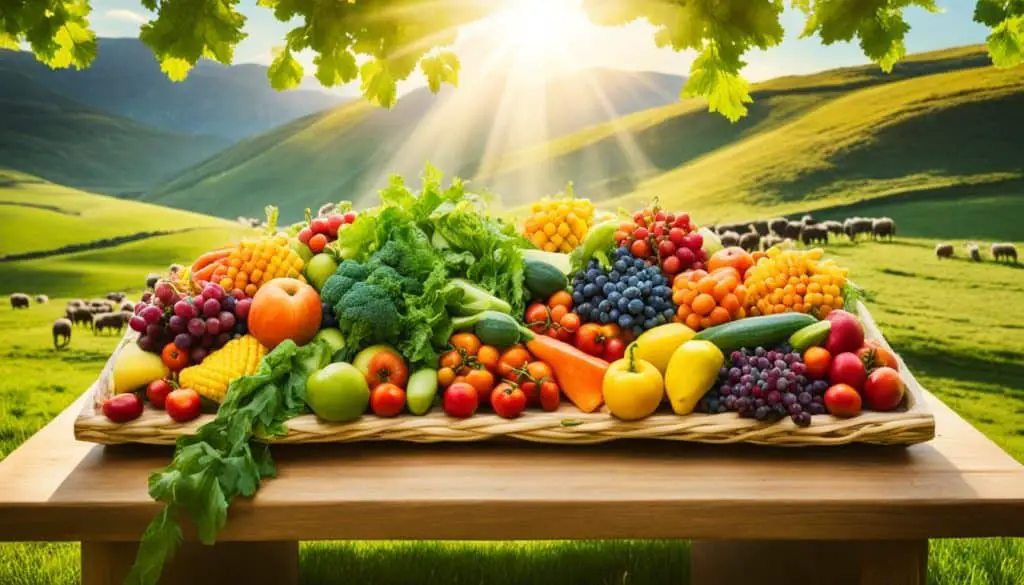
Benefits of the Firstfruits Offering:
- Deepens our relationship with God and strengthens our faith
- Teaches us the principle of giving sacrificially and trusting God for provision
- Encourages a spirit of gratitude and contentment
- Helps us recognize the abundance we have and develop a generous mindset
- Supports the work of the church and the needs of the community
The firstfruits offering is a way to participate in an ancient practice. It expresses our love for God and asks for His continued blessings.
| Key Takeaways from the Firstfruits Offering |
|---|
| 1. Gratitude: The firstfruits offering is a tangible expression of our gratitude to God for His provision. |
| 2. Trust: By giving the first portion of our harvest, we demonstrate our trust in God’s faithfulness and provision. |
| 3. Prioritizing God: The firstfruits offering reminds us to put God first in our lives and acknowledge Him as the source of all our blessings. |
| 4. Generosity: This act of giving encourages a spirit of generosity, teaching us to share our blessings with others. |
| 5. Worship: Offering the firstfruits is an act of worship, honoring God for His goodness and provision. |
The Sabbatical Year
The Sabbatical Year was key in ancient farming practices. Every seventh year, farmers took a break. This break let the land rest and grow healthier. It meant better soil for future harvests and more sustainable farming.
During this year off, the land recovered. Not working the land helped nutrients rebuild. This “rest for the land” was good for the environment. It also increased crop production in the years after.

This year also had a religious side. Farmers spent it on spiritual activities. They could focus on praying and connecting with a higher power. This helped them lead a more balanced life, valuing spiritual well-being as much as material wealth.
The Sabbatical Year shows ancient wisdom. It mixed physical rest for the land with spiritual refreshment for farmers. This approach promoted sustainable farming while fostering gratitude toward the divine.
Fulfilling God’s Plan
“Observe the Sabbath year by not planting your fields or pruning your vineyards. The land, after all, has its own sabbaths, as do you.” – Exodus 23:10-11
In Exodus, God commands observing the Sabbatical Year. This meant faith and obedience for farmers. It aligned them with God’s plan of balance and sustainable farming.
Sustainable and Spiritually Enriching
The Sabbatical Year balanced rest for the land with spiritual pursuits. It showcased the holistic view of farming in the Bible. This taught careful earth stewardship while valuing both the physical and spiritual worlds.
This practice reminded farmers of divine blessings. It led to a deeper sense of gratitude. Farmers renewed their dedication to sustainable agriculture through this year-long reflection.
| Sabbatical Year Benefits | Sabbatical Year Practices |
|---|---|
| Restored soil fertility | Leaving fields uncultivated |
| Improved crop yields | Practicing crop rotation |
| Spiritual growth and reflection | Focusing on worship and prayer |
Water Management Techniques
In biblical times, managing water well was key to growing successful crops. The Bible gives us a peek into how farmers made sure their fields got enough water.
A method highlighted in Deuteronomy 8:7 is digging wells. By digging deep, farmers found water below the surface. These wells offered a steady water source, helping crops survive all year long.
Creating irrigation channels was also common. By using these channels, farmers could water their fields evenly. They diverted water from rivers, ensuring their crops got just the right amount of moisture.
Accompanying Table: Water Management Techniques in Biblical Agriculture
| Water Management Technique | Description |
|---|---|
| Digging Wells | Farmers dug wells to find water below the surface, guaranteeing a constant supply for their crops. |
| Irrigation Channels | Farmers built channels to spread water in their fields, making sure their crops grew well. |
These innovative water methods were essential for farming success back then. Knowing how to dig wells and build irrigation channels was crucial. It helped farmers produce healthy, abundant crops.

Threshing and Winnowing
Threshing and winnowing are ancient methods noted even in the Bible. These practices were key to separate good grains from the bad chaff. This allowed for the gathering of only the pure and usable harvests.
The book of Ruth 3:2 talks about threshing boards and winnowing forks. These tools were vital in farming back then. Threshing boards, like wooden sledges with sharp edges, separated the grain from husks with pressure. Winnowing forks, though, tossed the mix into the air. This let the wind carry off the chaff, leaving the grains to fall back down.
“And now is not Boaz of our kin, with whose maidens thou wast? Behold, he winnoweth barley tonight in the threshing floor.”
Threshing and winnowing weren’t just about grain cleaning. They were also big symbols in the Bible, showing divine judgment and separating good from evil. These processes teach us about choosing wisely and striving for purity, in both the real and spiritual worlds.
Learning about threshing and winnowing shows us the smart and resourceful farming methods of the past. These ways led to harvesting healthy grains while getting rid of the bad. It was a sure path to having enough food and a rich farming yield.
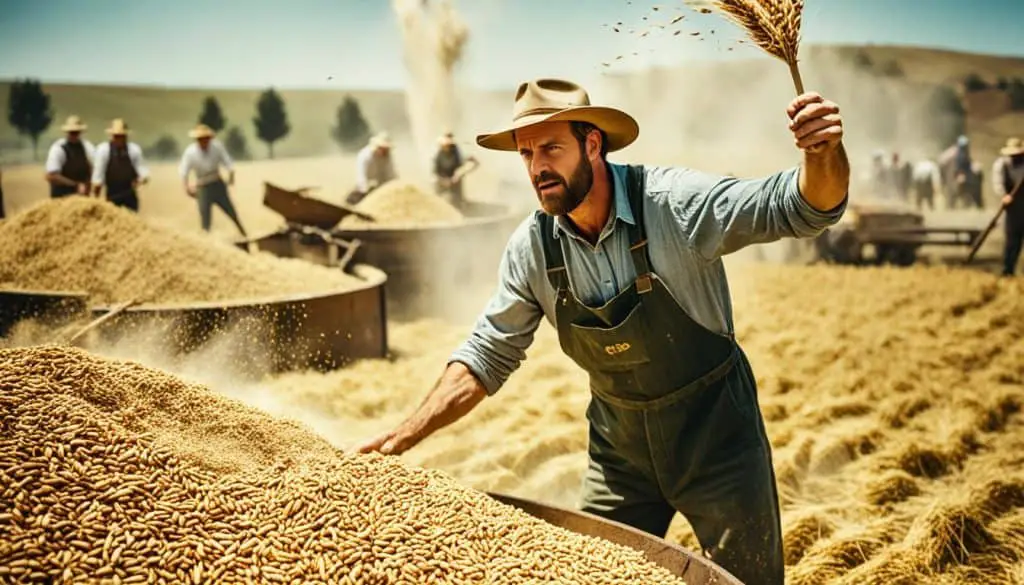
| Technique | Method |
|---|---|
| Threshing | Using threshing boards to separate grain from husks through pressure. |
| Winnowing | Using winnowing forks to toss the threshed mixture into the air, letting the wind blow away the lighter chaff. |
Olive Cultivation and Oil Production
In the Bible, olive cultivation and oil production are key farming practices. Deuteronomy 8:8 talks about olive groves, showing they were important in those times. People grew olive trees for their fruits, which they used to make precious olive oil.
To grow olives, farmers planted and took care of olive trees. The warm, dry weather in the Mediterranean helped the trees bear lots of fruit. Farmers picked the olives at just the right time to ensure they tasted good and had lots of oil. They used special methods to pick them carefully to get the best yield.
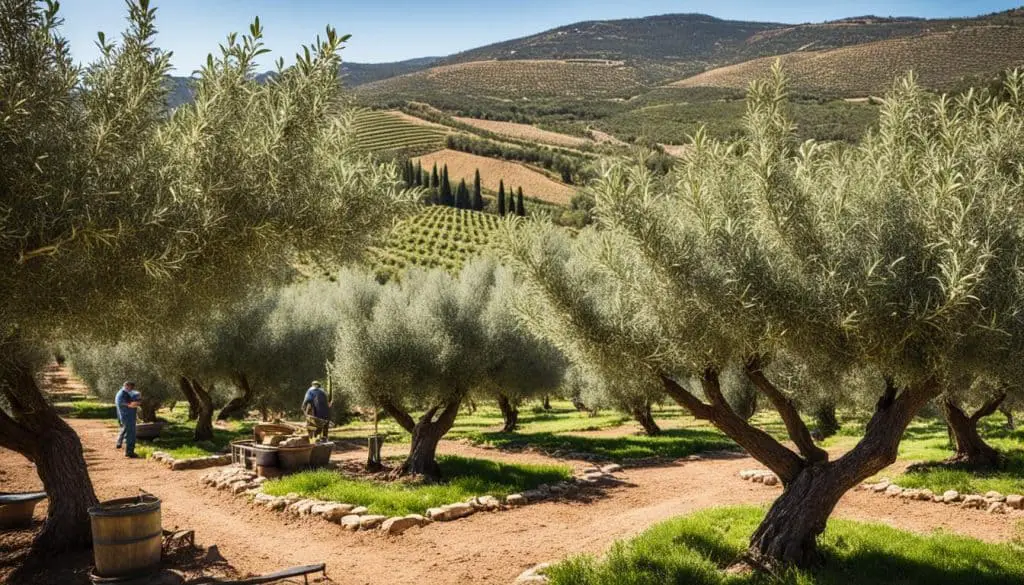
Then, the olives went through a process to get the oil out. They were crushed to a pulp, then pressed to squeeze out the oil. This oil was highly sought after for food, medicine, and beauty products.
“The olive tree is surely the richest gift of heaven.” – Thomas Jefferson
Olive oil was super useful in the past. People cooked with it, seasoned their food, and used it in ceremonies. It was also prized for its health benefits, skincare, and hair care.
To sum up, growing olives and making oil was crucial in old farming. It gave people important items, and it influenced their culture, food, and economy.
| Benefits of Olive Cultivation and Oil Production | Uses of Olive Oil in Ancient Times |
|---|---|
|
|
Conclusion
The Bible talks about farming methods that still matter today. These ways helped make farming work better and showed values like taking care of the earth. They also taught us to be fair and thankful to God.
Crop rotation and letting the land rest kept the soil good for growing crops. Separating different crops or not planting mixed seeds kept things pure. This made sure the food was safe to eat. Giving the poor parts of the crop was a way to be fair and caring for others.
First, farmers gave the best of their crops to God to say thank you for plenty. They also took a break from farming every few years to relax and help the land recover. Managing water with wells and channels made sure the crops had enough water.
Threshing and winnowing helped farmers clean the grain for food. Olive growing and making oil were very important activities. The Bible’s farming advice covered many areas. It spoke about doing things in a way that keeps the land and people healthy.

